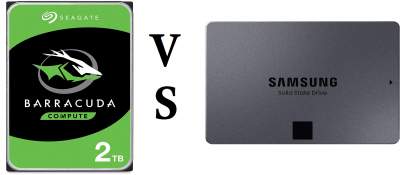HDD VS SSD
Hard drive disk(HDD) was first released in June 1956 whereas the first Solid state drive(SSD) was released in 1991.The SSD became the HDD’s first and only competition and their rivalry has continued ever since.
A HDD is basic storage for your PC. A hard drive contains disks that store data with the help for read/write heads when the disks rotate.
An SSD can also be used for storage in a PC but unlike its competitor an SSD has no mechanical parts and it stores data on interconnected flash-memory chips. Electrons are used to read and write data.
Below are the differences between an HDD and SSD.
| HDD | SSD |
| Less expensive than an SSD(A 1TB hard drive costs around $40 to $60) | More expensive than a HDD(A 1TB SSD costs about 100$ at the time of this writing) |
| The maximum storage capacity of HDD (20TB) is commonly found in high-end systems.1 to 2 TB HDD is the most common size used nowadays. | Although SSD’s are found in 100TB sizes but they are too expensive to be used by people for everyday use. 500GB SSD is the most common size used nowadays. |
| Every HDD, no matter how quiet, emits noise and the faster the HDD retrieves data, the more noise it produces. | As an SSD is non- mechanical so they produce no noise |
| Heavier than SSD and this adds to the overall weight of your laptop. | Lighter than HDD. |
| Slower than the competition (as it uses mechanical parts, so it is slower and you might suffer from latency). | Faster than the hard drive (as it uses electrons, which travel at 2,200 km/s). |
| They can be damaged it they fall | They are more reliable as they don’t take much damage if they fall or hit something. |
| A HDD requires time to achieve its full capacity which will still be slower than an SSD. | A SSD boots up faster and is faster than its competition in every aspect. |
| It becomes hotter the more extensively it is used (Friction between the moving parts cause the heat). | It stays cool no matter how much you use it (no moving parts). |
| Uses more power in comparison to a SSD (Some of that power is converted in to friction and noise) | Uses less power (As an SSD has no mechanical parts so no power is wasted on friction and noise) |
| The read/write operations available per day are greater than those of SSD’s. | An SSD can only perform 20GB’s of read/writer operations per day over a period of 3 years after which they become ineffective. |
Recommended article for reading
If you are looking for laptops with HDD’s and SSD’s then the following articles can help you with your search

